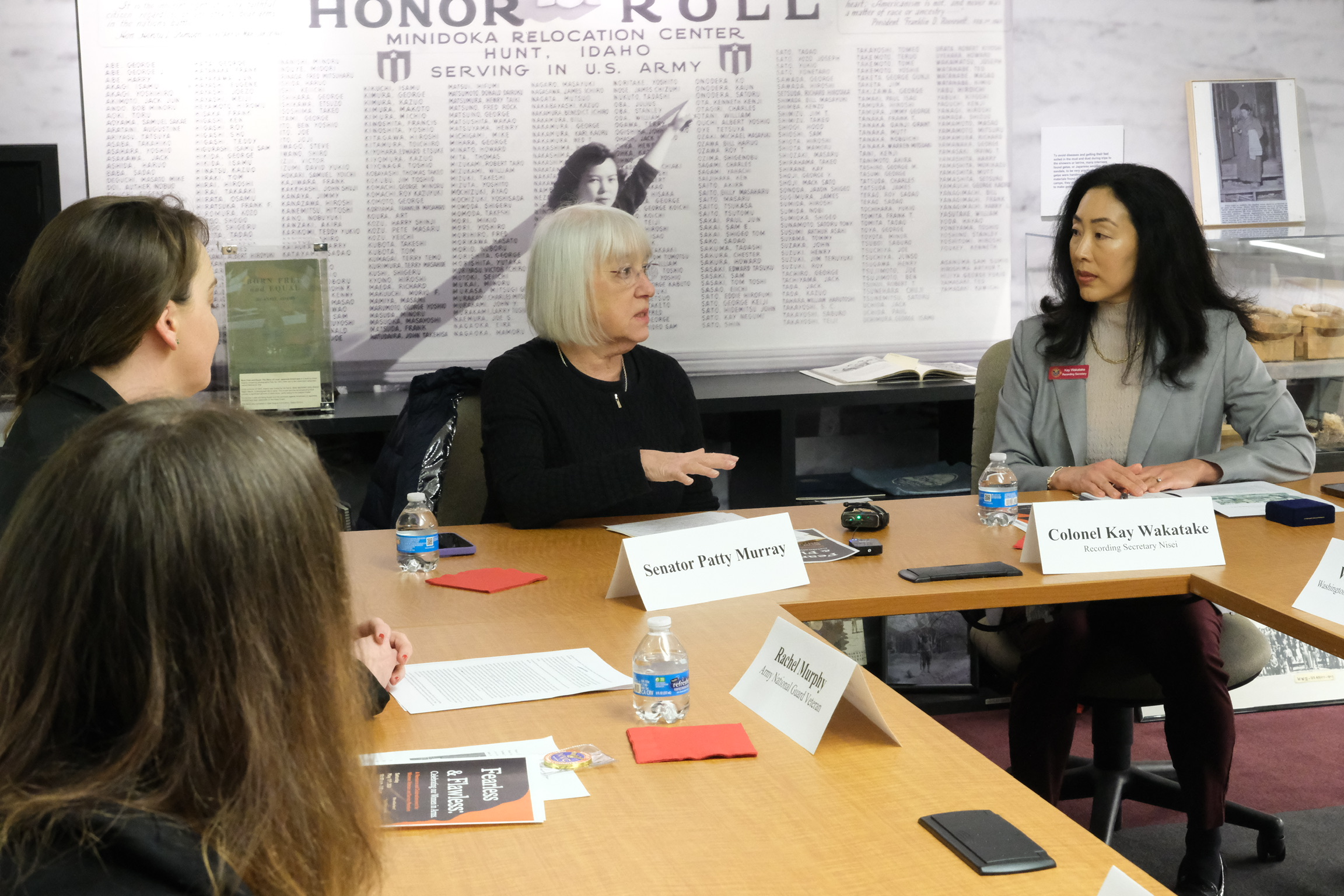Senator Murray: “It’s especially important to me that we do a better job looking out for the health care of our fastest-growing demographic of veterans—women.”
***PHOTOS AND B-ROLL of today’s event HERE***
Seattle, WA – Today, U.S. Senator Patty Murray (D-WA), Chair of the Senate Appropriations Committee and the VA subcommittee, hosted a roundtable discussion on improving health care for women veterans. At the roundtable, held at Nisei Veterans Memorial Hall in Seattle’s International District, Murray heard directly from women veterans, Veteran Service Organizations, and VA officials and discussed her efforts to deliver strong funding for women veteran’s health care as she negotiates the Department of Veterans Affairs (VA) funding bill for Fiscal Year 2024.
Women veterans make up nearly 17 percent of active-duty military forces and 19 percent of National Guard and Reserves, and account for over 30 percent of the increase in veterans enrolled in VA health care over the past five years. A comprehensive study released in September by the Wounded Warrior Project found that, compared to male veterans, women veterans are more likely to seek care through the VA—but they face more barriers than men when it comes to actually receiving care. Gender-specific care, which includes routine mammograms and OB-GYN checkups, can be difficult to come by, and the report also found that female veterans are more likely than their male counterparts to experience moderate to severe symptoms of depression, post-traumatic stress disorder and anxiety. Women reported sexual trauma at a rate more than three times higher than male veterans—but said they received related care less often through the VA.
“Our country made a promise to everyone who served in uniform that after your service ends, we will take care of you and your family when you come home—it has always been a personal mission of mine to make sure we are doing everything we can to fulfill that promise,” said Senator Murray. “It’s especially important to me that we do a better job looking out for the health care of our fastest-growing demographic of veterans—women. Even though women are more likely to seek care through VA, and are more likely to be dealing with depression, anxiety, or sexual trauma—women are also more likely to face barriers to getting the care they need. I am fighting hard to deliver strong federal funding for women veterans’ health care in our VA funding bill and improve access to OB-GYNs, maternity care, mammograms, child care at VA facilities, and other important resources women veterans need.”
As Chair of the Appropriations Committee and the subcommittee that funds VA, Murray secured a record $1.3 billion—a $439 million boost—for gender-specific health care services and improvements in the draft VA Appropriations bill for Fiscal Year 2024, which passed the Senate in a bipartisan 82-15 vote in November. Right now, Senator Murray is negotiating the final VA funding bill and working to ensure that strong federal funding for women veteran’s health care is included in the legislation.
“Senator Murray’s women veterans roundtable ties well with the U.S. Department of Veterans Affairs’ comprehensive efforts to ensure our Nisei veterans, their families, and their survivors are engaged with VA’s Agency Equity team. We’re grateful for the opportunity to host the roundtable at the Nisei Veterans Committee’s Memorial Hall,” said a representative from the Nisei Veterans Committee.
Senator Murray was the first woman to join the Senate Veterans Affairs Committee and the first woman to chair the Committee—as the daughter of a WWII veteran, supporting veterans and their families has always been an important priority for Murray.
Advocating for women veterans in particular has been a longtime focus for Senator Murray, as Chair of the Senate Veterans’ Affairs Committee in 2010, Senator Murray passed her landmark Women Veterans Health Improvement Act into law. Murray has worked to permanently authorize the VA child care pilot program to increase access to free, quality child care for veterans during their appointments, make much-needed improvements to the women veterans call center, and fix a loophole that left veterans footing the bill for medically-necessary emergency newborn transportation that VA should be covering. Murray introduced and helped pass the historic Deborah Sampson Act, legislation to address gender disparities at VA that established a dedicated Office of Women’s Health at VA and required every VA health facility to have a dedicated women’s health primary care provider, among other things. Murray also helped to pass the MAMMO Act to expand access to high-quality breast cancer screening and treatment services for veterans. President Biden signed both bills into law in 2021.
In September, Murray reintroduced her Veteran Families Health Services Act, comprehensive legislation that would expand fertility treatments and family-building services for servicemembers and veterans who are unable to conceive without assistance. During her time as Chair of the Senate Veterans’ Affairs Committee, Senator Murray oversaw the initial implementation of the Caregiver Support Program in 2011, fought successfully to pass legislation to greatly expand the program and has been closely following its implementation since then.
###


